The British Left on Ireland
Since the Irish Left Archive began it has included documents from the British left on Ireland, and these have accumulated over the years to cover a wide range of groups. This collection shows some of the positions taken by the British left over the course of the last several decades.
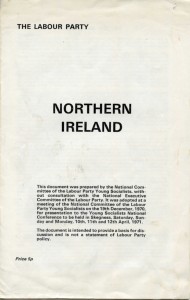
Northern Ireland (1971)
Labour Party Young Socialists
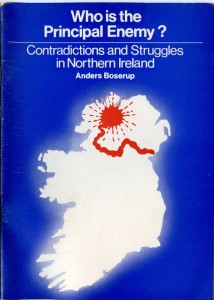
Who is the Principal Enemy? (1972)
Independent Labour Party
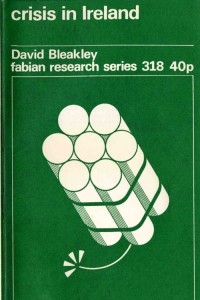
Crisis in Ireland (1974)
Fabian Society
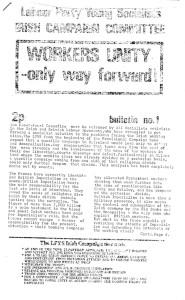
Workers Unity – Only Way Forward! (1974)
Labour Party Young Socialists
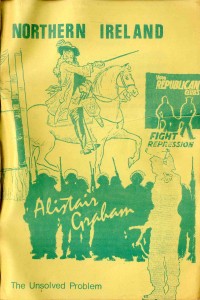
Northern Ireland: The Unsolved Problem (1976)
Independent Labour Publications
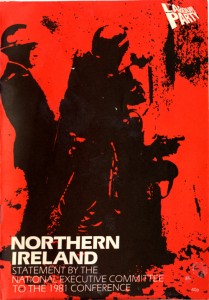
Northern Ireland (1981)
Labour Party [Britain]
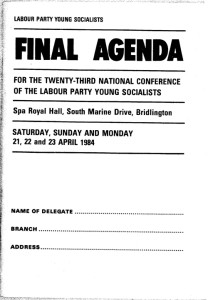
Final Agenda For the Twenty Third National Conference of the Labour Party Young Socialists (1984)
Labour Party Young Socialists
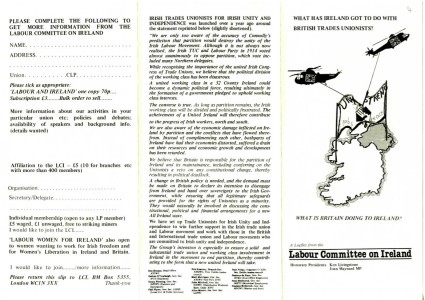
What Has Ireland Got to Do with British Trades Unionists? What is Britain Doing to Ireland? (1985 c.)
Labour Party [Britain]
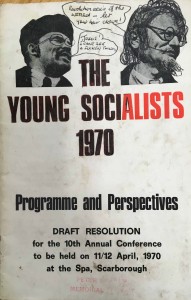
The Young Socialists 1970: Programme and Perspectives (1970)
Young Socialists [SLL]
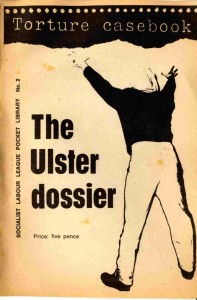
Torture Casebook: The Ulster Dossier (1971)
Socialist Labour League
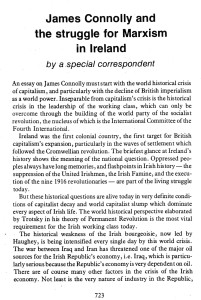
James Connolly and the struggle for Marxism in Ireland (1980)
Workers Revolutionary Party
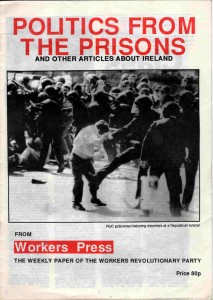
Politics from the Prisons and other Articles about Ireland (1988)
Workers Revolutionary Party (Workers' Press)
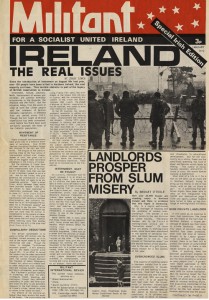
Militant – Special Irish Edition (1972)
Militant
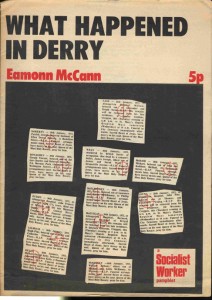
What Happened in Derry (1972)
International Socialists [UK]
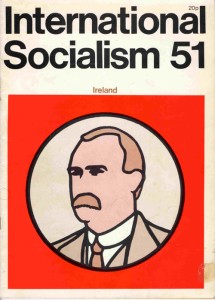
International Socialism, No. 51 (1972)
International Socialists [UK]
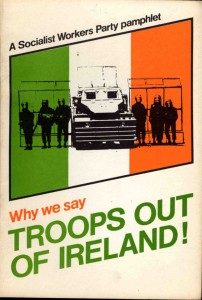
Why We Say: Troops Out of Ireland! (1980)
Socialist Workers' Party [UK]
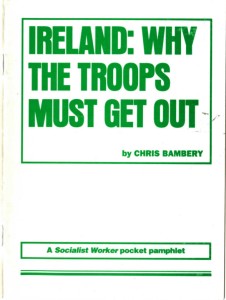
Ireland: Why the Troops Must Get Out (1992)
Socialist Workers' Party [UK]
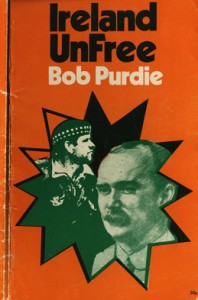
Ireland Unfree (1972)
International Marxist Group
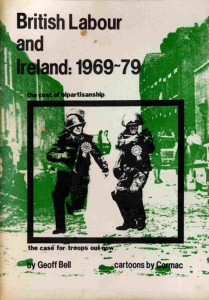
British Labour and Ireland: 1969 − 1979 (1979)
International Marxist Group
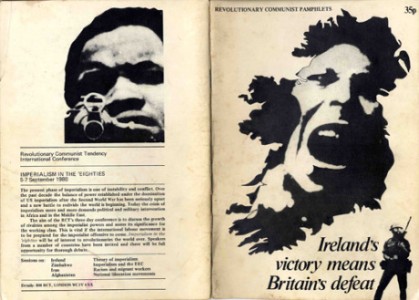
Ireland's Victory Means Britain's Defeat (1980)
Revolutionary Communist Tendency
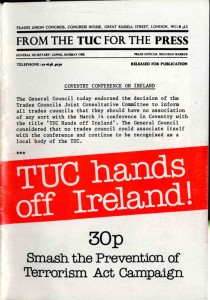
TUC Hands off Ireland! (1981)
Revolutionary Communist Tendency
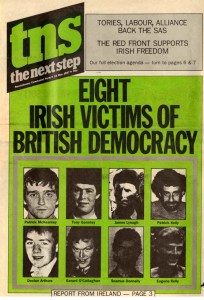
The Next Step, No. 18 (1987)
Revolutionary Communist Party
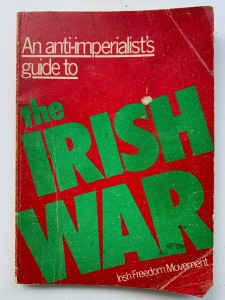
An Anti-Imperialist's Guide to the Irish War (1983)
Irish Freedom Movement
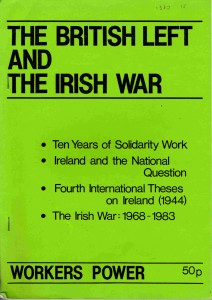
The British Left and the Irish War (1983)
Workers Power [UK]
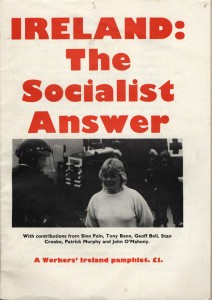
Ireland: The Socialist Answer (1989)
Socialist Organiser Alliance
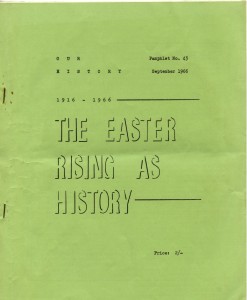
The Easter Rising As History (1966)
Communist Party of Great Britain
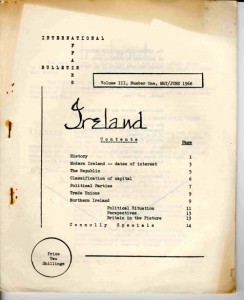
International Affairs Bulletin, Vol. 3, No. 1 (1968)
Communist Party of Great Britain
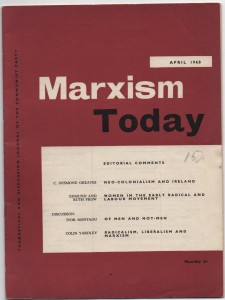
Marxism Today, Vol. 12, No. 4 (1968)
Communist Party of Great Britain
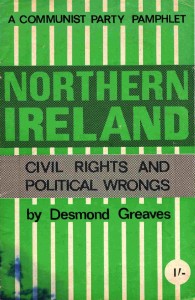
Northern Ireland: Civil Rights and Political Wrongs (1969)
Communist Party of Great Britain
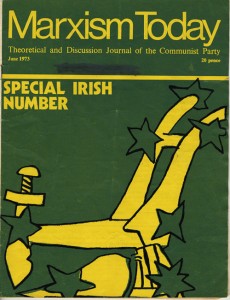
Marxism Today: Special Irish Number (1973)
Communist Party of Great Britain
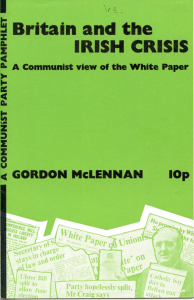
Britain and the Irish Crisis (1973)
Communist Party of Great Britain
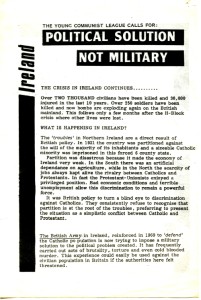
Ireland: The Young Communist League Calls for: Political Solution Not Military (1979)
Young Communist League
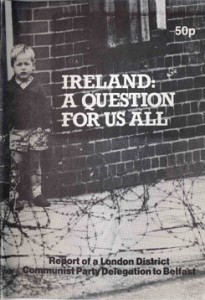
Ireland: A Question for us all (1983)
Communist Party of Great Britain
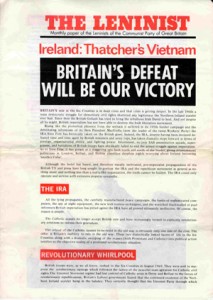
The Leninist: Ireland: Thatcher's Vietnam (Supplement) (1985)
Communist Party of Great Britain (Leninist grouping)
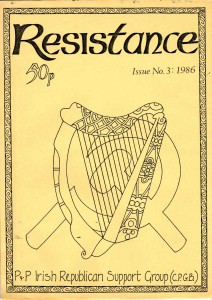
Resistance, No. 3 (1986)
Communist Party of Great Britain
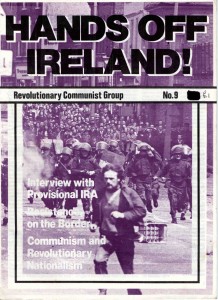
Hands Off Ireland!, No. 9 (1979)
Revolutionary Communist Group
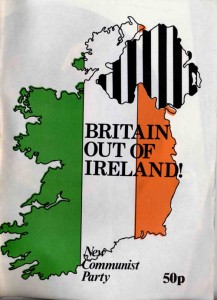
Britain Out of Ireland! (1987)
New Communist Party
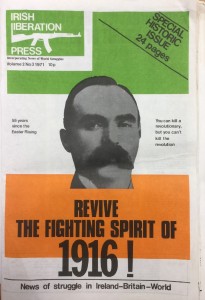
Irish Liberation Press, Vol. 2, No. 3 (1971)
Irish National Liberation Solidarity Front
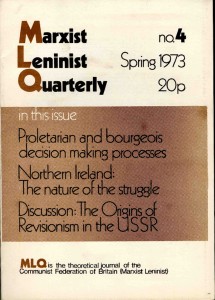
Marxist Leninist Quarterly, No. 4 (1973)
Communist Federation of Britain (Marxist-Leninist)
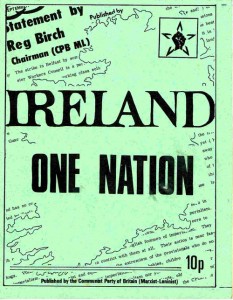
Ireland One Nation (1974)
Communist Party of Britain (Marxist-Leninist)
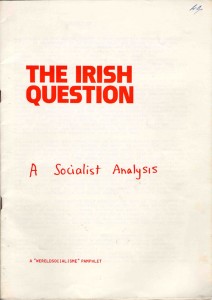
The Irish Question: A Socialist Analysis (1976)
Socialist Party of Great Britain
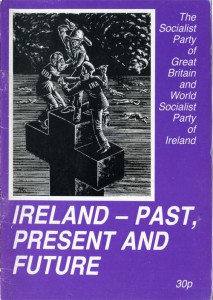
Ireland — Past, Present and Future (1983)
Socialist Party of Great Britain
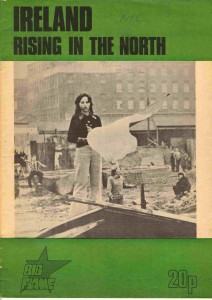
Ireland: Rising in the North (1981)
Big Flame
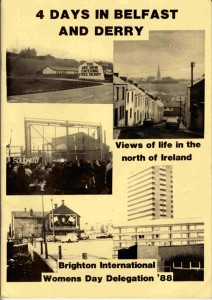
4 Days in Belfast and Derry: Views of Life in the north of Ireland (1988)
Brighton Women and Ireland Group
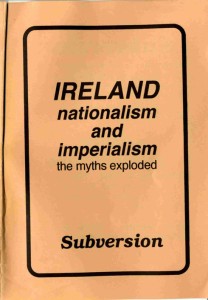
Ireland: Nationalism and Imperialism - The Myths exploded (1992)
Subversion
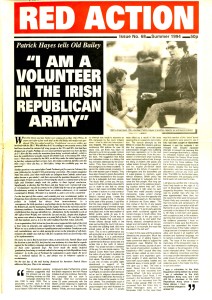
Red Action, No. 68 (1994)
Red Action [Britain]
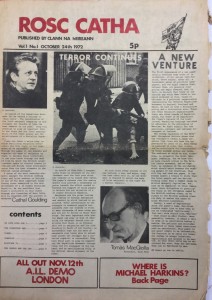
Rosc Catha, Vol. 1, No. 1 (1972)
Clann na hÉireann
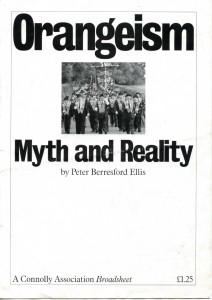
Orangeism - Myth and Reality (1995)
Connolly Association
About this Collection
Since the Irish Left Archive began it has included documents from the British left on Ireland, and these have accumulated over the years to cover a wide range of groups. Given the increased political attention being paid to understandings of and perspectives on Ireland in Britain since the Brexit vote brought the issue of its status back into the wider public discourse, we have created this collection to show some of the positions taken by the British left over the course of the last several decades.
A number of parties and organisations on the left in Ireland, North and South, have had their origins in UK sibling parties, with varying degrees of independence - from established fraternal organisations, to more short-lived Irish groups with a limited foothold or independent existence in Ireland. Back-and-forth migration between Ireland and Britain also meant that membership of Left organisations in the UK has influenced the establishment of Irish political organisations by returning members. Furthermore, Irish diaspora membership and Irish support organisations in Britain add to a pattern of interaction and mutual influence in many Left traditions on both islands.
Below we have outlined the documents available in the archive from the British Left, grouped broadly into the different Left traditions.
British Labour Party (and related groups)
Beginning with Labour and related groups, an Independent Labour Party pamphlet from 1972, Who is the Principal Enemy? Contradictions and Struggle in Northern Ireland, provides a perspective from that party just prior to its merging with the Labour party. Northern Ireland: The Unsolved Problem from 1976 gives a descriptive background to Northern Ireland from Independent Labour Publications (which the ILP became within the Labour Party).
From 1974, Crisis in Ireland, written by David Bleakley and published by the Fabian Society, sets out his perspective on the North and proposed strategy for Labour.
A statement from the National Executive Committee to the 1981 Labour conference on Northern Ireland sets out the results of a study group within Labour on NI, and includes an interesting outline of the rationale for not organising in NI.
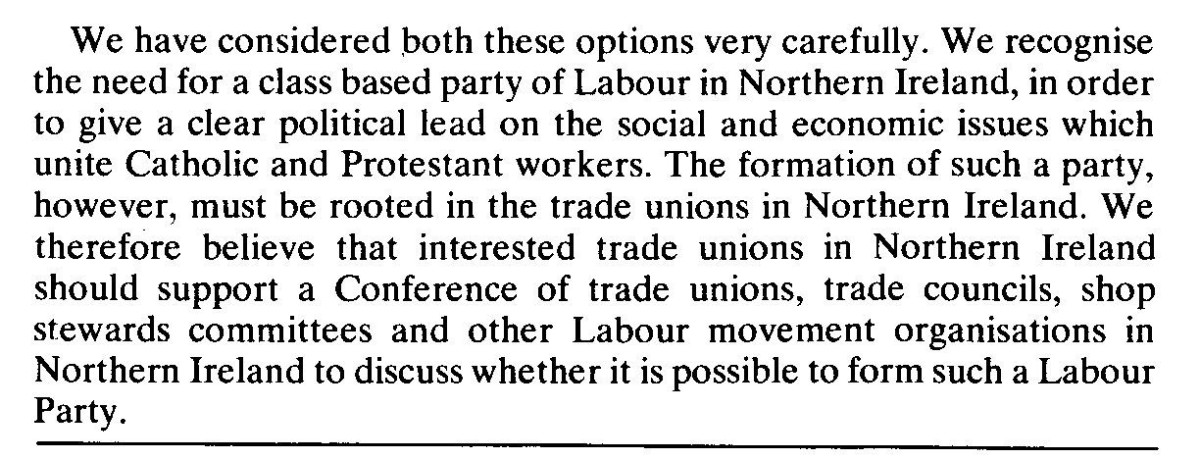
A short leaflet from the Labour Committee on Ireland from the mid-1980s addresses the question “What Has Ireland Got to Do with British Trades Unionists? What is Britain Doing to Ireland?”
Documents from the Labour Party Young Socialists, the youth wing of the Labour party, provide another perspective from within British Labour, not necessarily representative of party policy. It is notable that LPYS was dominated by Militant throughout the 1970s and 80s. First, from 1970, we have a discussion paper on Northern Ireland from the National Committee of LPYS. From 1974, “Workers’ Unity - Only Way Forward!” from LPYS Irish Campaign Committee gives an analysis of the situation that welcomes ‘the Provisional Ceasefire”. It calls for:
Workers Unity – Only Way Forward!, p. 1
- An end to the Tory Bi-Partisan Approach: For Socialist Policies and support for the Irish organisations of Labour.
- For a Trade Union Defence Force to defend all Areas, Catholic and Protestant, from sectarian attacks and to defend workers while going to and while at work.
- Withdraw the Troops
- End Internment and all repressive legislation
- Release all political prisoners in Ireland and Britain
- Trade Union rights for the Armed Forces
- For a Conference of Workers Organisation from Ireland and Britain to forge unity in Action against the common enemy of capitalism
These aims among others appear again in the motions outlined in the April 1984 agenda for national conference.
Trotskyist Groups
Several Trotskyist traditions from the UK are represented in the archive. Several groups at various times practised entryism within the Labour party, sometimes only forming external organisations as a result of Labour expulsion. It is interesting to note that as well as many instances of fraternal Irish organisations, there are prominent Irish emigrants such as Gerry Healy who led the Socialist Labour League (later Workers Revolutionary Party) or Sean Matgamna, founder and prominent member of what is now the Alliance for Workers’ Liberty. It is reasonable to assume perspectives on Ireland would have been influenced by this.
The Socialist Labour League (SLL) has its origins in the Trotskyist entryist group, The Club, in the Labour party1. It was proscribed by Labour in 1959, but remained active in the Labour youth wing, the Young Socialists, during the early 1960s until the youth wing was wound up and re-established2. From 1970, the archive contains the draft Programme and Perspectives for the then external SLL Young Socialists conference, which includes their perspective on Northern Ireland. From 1971, the SLL’s Torture Casebook: The Ulster Dossier compiles reports of torture in Northern Ireland, and outlines the SLL’s demands for Ireland:
![The Socialist Labour League calls for:
* The removal of the Tory government by mass industrial and political action by the Irish and British unions.
* Its replacement by a Labour government pledged to socialist policies of nationalization of industry[,] commerce, and the land, without compensation under workers' control.
* The immediate and unconditional withdrawal of all troops from Ulster.
* The repeal of the Special Powers Act and the immediate release of all men interned.
* The removal of the Stormont Tory regime and the unification of Ireland.
* The nationalization of industry, commerce and land, N and S, without compensation under workers' control.](/image/4/1200/1200/images/inline/sll_ni_demands.jpeg)
The SLL became the Workers’ Revolutionary Party (WRP) in 1973. From the WRP, here is a 1980 article on “James Connolly and the struggle for Marxism in Ireland”. The WRP fractured in the mid-1980s, with competing groups carrying the name, distinguished by their publications. From the WRP (Workers’ Press), led by Cliff Slaughter, a collection of articles from Workers’ Press on Ireland is compiled in the document Politics from the Prisons, which sets out their perspective. It includes articles on Sinn Féin’s Question’s of History pamphlet (viewed positively by the WRP); Trotskyism and Nationalism; and “Stand firm against anti-IRA witch-hunt”, written in the aftermath of the Enniskillen bombing.
Militant took an entryist strategy within the Labour party until expulsions in the 1980s leading to the “open turn” in 1991. (For material from the Labour Party Young Socialists, which was dominated by Militant, see the section on Labour above). It gained supporters in Ireland from the early 1970s, with a fraternal group established by 1972. From prior to the establishment of a regular Irish publication later that year, a 1972 “special Irish number” issue of Militant includes an article from Peter Taaffe (a leading figure in Militant in England and later General Secretary of the Socialist Party of England and Wales), in which he argues against the “two nations” view of Northern Ireland, criticising Conor Cruise O’Brien of Irish Labour and “those “Marxist” tendencies who have embraced the “theory”” (likely referring to the British and Irish Communist Organisation, who adhered to this view). An article entitled “One Answer - Workers’ Unity”, by Peter Hadden (who was instrumental in establishing a Militant group in Northern Ireland), sets out Militant’s perspective on addressing Northern Ireland. A further article is critical of the Provisionals: “Provisional I.R.A. strategy will not defeat imperialism”.
The International Socialists (IS), which later became the Socialist Workers’ Party (SWP), originated with a group around Tony Cliff, the Socialist Review Group, which formed around Cliff’s analysis of the Soviet Union as state capitalist. Supporters in Ireland formed the Socialist Workers Movement in 1971 (now the Socialist Workers Network in People Before Profit). From 1972, Eamonn McCann’s account of Bloody Sunday, What Happened in Derry?, was published as a pamphlet by IS. The archive also includes an issue of International Socialism from that year focused on Ireland, which includes articles from McCann, Brian Trench and John Palmer, and an analysis of the North from Paul Gerhardt.
From 1980, when the IS had become the SWP, Why we Say Troops Out of Ireland says in the introduction:
British troops were sent to ‘keep the peace’ in Northern Ireland in August 1969. Eleven years and almost 2000 deaths later the army remains on the streets. The violence that followed their arrival has been far greater than what went before. […] We in the SWP - and many other socialists too - believe that the only way to end the war for the benefit of the workers of Ireland and Britain is to get the troops out of Northern Ireland.
Troop withdrawal is also addressed in the 1992 document, Ireland: Why the Troops Must Get Out.
The International Marxist Group originated from the International Group (which practised entryism in the Labour party, but less systematically from the late 1960s), and was the British section of the Fourth International. Two documents from the group are included in the archive: Ireland Unfree, written by Bob Purdie in 1972 (later repudiated by him 3); and British Labour and Ireland: 1969 − 1979, written by Geoff Bell in 1979, which examines the British Labour Party’s policy on Ireland in that period.

The Revolutionary Communist Tendency (RCT) broke from the Revolutionary Communist Group (see ‘Other Communist Organisations’ below) in 1978. It became the Revolutionary Communist Party (RCP) in 1981. While originally a Trotskyist organisation, it has an unusual trajectory in shifting towards Libertarianism such that prior to its dissolution in 1997 it could be considered a party of the Right. (It continues in part through the magazine Living Marxism, which was succeeded by Spiked, a Right-Libertarian publication). The party took a strongly supportive line on Irish independence and opposition to British Imperialism.
The 1980 pamphlet, Ireland’s Victory Means Britain’s Defeat, states:
This pamphlet is our response to the deadlock in Ireland. The success of any British solution depends on the defeat of the national liberation movement. The opposite is also true: Ireland’s victory means Britain’s defeat. The left’s middle way – a British scheme to bring peace and progress to Ireland – is an illusion which can only give credibility to whatever solution the government finally devises. Our object is to win the support of the British working class for the struggle of the Irish people. The labour movement is their most powerful ally in the struggle for national independence. This steaks demands more than stirring workers’ sympathies for the Irish. It means winning their active support for the defeat of the British state.
Ireland’s Victory Means Britain’s Defeat, p.2
From 1981, TUC Hands off Ireland! argues that “TUC Irish policy is simply a cover for its complicity in British repression throughout the Irish War”, and criticises the TUC’s failure to support political status for prisoners and the Smash the Prevention of Terrorism Act Campaign. Finally from the RCP, a 1987 issue of their publication The Next Step looks at the killing of IRA volunteers at Loughgall under the front-page headline, “Eight Irish Victims of British Democracy”.
The RCP also set up the Irish Freedom Movement in 1982, from which the archive has the book, An Anti-Imperialist’s Guide to the Irish War.
From Workers’ Power in 1983, The British Left and the Irish War has “the aim of laying the political basis for solidarity work in Britain”. It includes the article “Ireland, The National Question, and the International Socialists (IS)”, which is highly critical of IS. Workers Power originated as the Left Faction within IS, from which it split in 1974. The Irish Workers Group, later also called Workers Power, were affiliated (and later participated in founding the League for the Fifth International).
Finally from British Trotskyist groups, Socialist Organiser Alliance, the group associated with Seán Matgamna in the 1980s that worked within the Labour Party and later became Alliance for Workers’ Liberty, printed Ireland: The Socialist Answer in 1989, which discusses Ireland “with contributions from Sinn Féin, Tony Benn, Geoff Bell, Stan Crooke, Patrick Murphy and John O’Mahony [Matgamna]”.
Communist Party of Great Britain (and related groups)
From the Communist Party of Great Britain (CPGB), a 1968 issue of International Affairs Bulletin gives an overview of the history and then current situation in Northern Ireland.
C. Desmond Greaves wrote extensively on Ireland and was influential as a CPGB member (and through the Connolly Association). From 1966, the archive includes his CPGB History Group pamphlet, The Easter Rising As History. Greaves’ analysis of NI for the CPGB is outlined in Northern Ireland: Civil Rights and Political Wrongs from 1969, and takes a strong ‘civil rights’ line, close to the approach of the Communist Party of Northern Ireland (CPNI) at that time. A further article entitled “Neo-Colonialism and Ireland” can be read in a 1968 issue of Marxism Today.
Moving forward a few years, a special edition of Marxism Today from 1973 features articles from a number of people associated with the then re-formed Communist Party of Ireland. The included articles deal again with Northern Ireland (the Sunningdale Agreement and the civil rights movement), but also include backgrounds to socialism and trade unionism in Ireland, and an assessment of Britain and Ireland in the then Common Market. From the same year, Britain and the Irish Crisis outlines the CPGB perspective on Sunningdale, which take a line sympathetic to the NICRA.
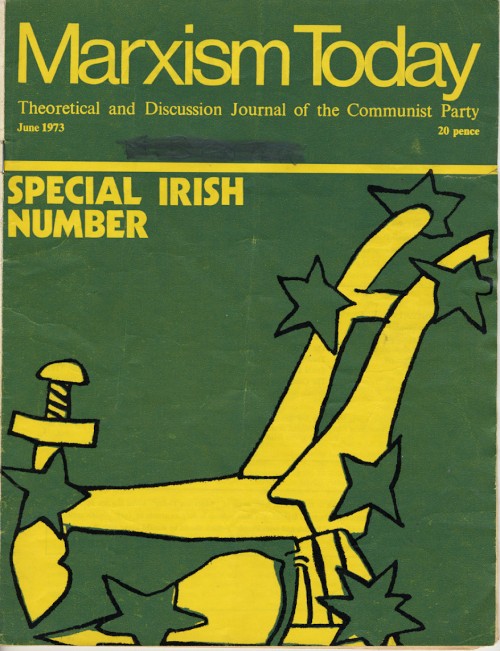
From 1979, a short pamphlet from the youth wing of the CPGB, the Young Communist League, Political Solution Not Military calls for “a declaration of intent to withdraw completely from Irish affairs”.
Ireland: A Question for us all reports on a London CPGB delegation to Belfast in 1983, and outlines the background, the present situation based on the delegation’s experiences, and including an outline of the political parties, and a prescription for the future, entitled “A Strategy for Withdrawal”. The pamphlet continues the CPGB commitment to British withdrawal from NI, as the introduction makes clear:
In Britain, Communists see their task as developing a clear ideological and political break between the working class movement and British imperialism which continues to rule in Northern Ireland with the tacit consent of the British people. We must fight to remove that consent and to demand a declaration of intent by the British government to withdraw from Northern Ireland, coupled with a broad programme for ending repression and instituting democratic reforms within the six counties that would create, in the shortest possible time, the political, social and economic conditions for the re-unification of Ireland. Ireland: A Question for us all, p. 7
Finally, two mid-1980s documents from the CPGB milieu, but from unofficial or unsanctioned groups, push for a firm pro-Republican position. First, a 1985 supplement to The Leninist, entitled “Ireland: Thatcher’s Vietnam” takes an unequivocally pro IRA and Sinn Féin position. The Leninist was published by an oppositional group loosely associated with the CPGB, which later went on to form the CPGB (Provisional Central Committee). And second, Resistance, No. 3, dating from soon after the signing of the Anglo-Irish Agreement, which was produced by an apparently small and unofficial “Irish Republican Support Group” within the CPGB.
Other Communist Organisations
A couple of British communist groups outside the CPGB are represented in the archive. First, the Revolutionary Communist Group, which was strongly supportive of Republicanism, produced Hands Off Ireland - a regular journal started in 1976. Issue number 9 in the archive includes an interview with the Provisional IRA and articles on a H-Block press visit, “Resistance on the Border” and “Communism and Revolutionary Nationalism”.
From the New Communist Party, which was formed from a CPGB split in 1977, we have Britain Out of Ireland!, published in 1987, it provides an outline history, and states:
The position of all genuine progressives must begin from an understanding that Ireland first of all must have the right to self-determination and real independence. Post independence developments and the method of reunification can only be conducted by the Irish people as a whole once Britain has gone…
Maoists
Turning to Maoist parties, the Irish National Liberation Solidarity Front was active from 1969, and was the sole focus of the Communist Workers League of Britain (Marxist–Leninist) until they shifted to activity under the latter name in 1972. It published, Irish Liberation Press, of which the archive has one issue from 1971: Irish Liberation Press, Vol 2, No. 3.
Ireland One Nation (1974), from the Communist Party of Britain (Marxist-Leninist) (CPB(M-L)), outlines the political history of Ireland and argues for British withdrawal. The conclusion quotes from an 1869 letter from Marx to Engels: “… it is in the direct and absolute interest of the English working class to get rid of their present connection with Ireland” and states:
Our task in Britain is very clear; to demand the immediate and unconditional withdrawal of British troops from Ireland. However we disclaim it, we are part of the oppression of Irish workers.
Ireland One Nation, p. 15
The document also includes a preface with a statement from Reg Birch, chairman and central figure in the CPB(M-L), on the Ulster Workers Council strike.
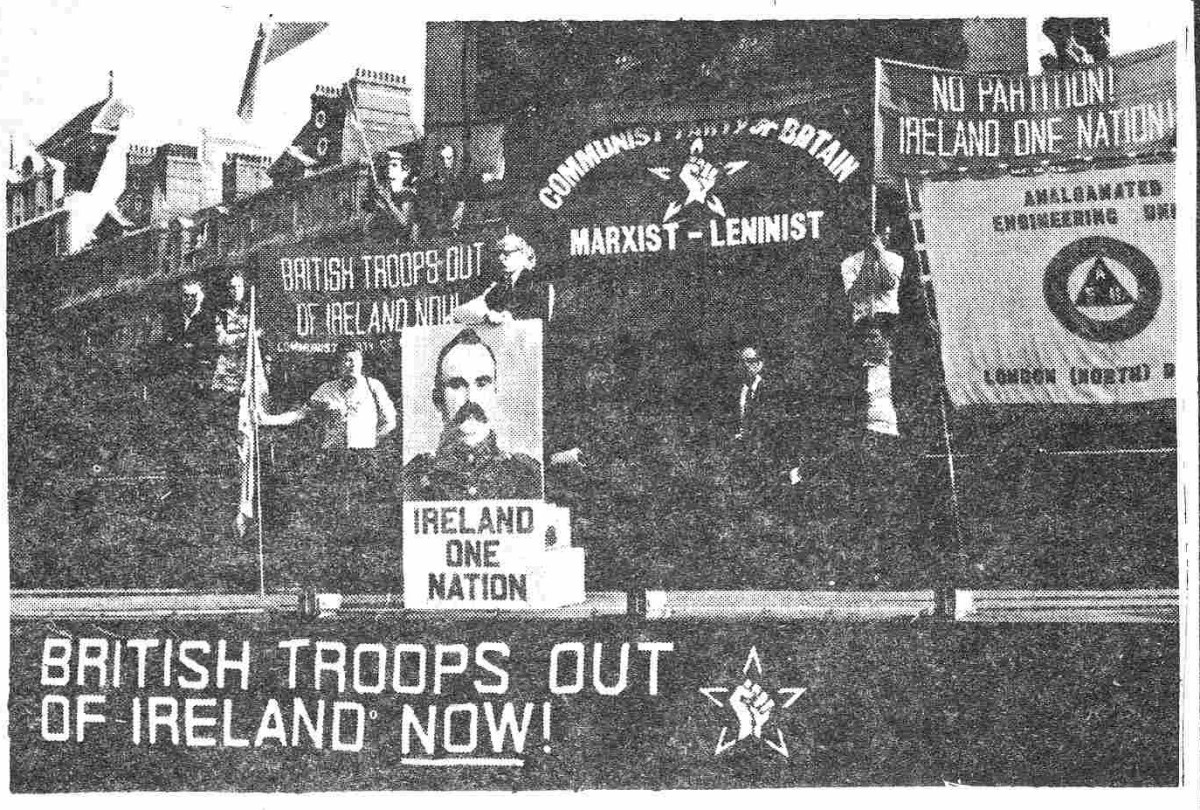
The Communist Federation of Britain (Marxist-Leninist) (later becoming the Revolutionary Communist League of Britain), like the CPB(M-L), had emerged as a Maoist split from the CPGB in the late 1960s. From their theoretical journal, Marxist Leninist Quarterly, we have an issue from 1973 which gives a perspective on Ireland in an article entitled “Northern Ireland: The Nature of the Struggle”.
Socialist Party of Great Britain
From the Socialist Party of Great Britain, a 1976 pamphlet, The Irish Question: A Socialist Analysis, presents a highly critical view of the history of Irish Republicanism, and of both states in Ireland. It states “the political history of the two parts of Ireland differs but both governments […] did have one thing in common: a consistent anti-working class and anti-democratic character” (p.18), and describes the goal of a United Ireland as a “dream of an Independent Irish state capitalist economy” (p.31).
A 1983 pamphlet, jointly ascribed to SPGB and its Irish sibling party, the World Socialist Party of Ireland, Ireland - Past, Present and Future, provides an outline on Ireland under the headings ‘The Origins of Sectarianism’, ‘The Roots of Nationalism’, ‘Partition and the Consequences’, ‘Civil Rights and Political Violence’ and ‘Socialism’. Again, coming from the World Socialist Movement perspective, it is highly critical, describing the Civil Rights movement’s demands as having “amounted to no more than an insistence that the miseries of capitalism […] be distributed among the working class without regard to their religion” (p.16) and arguing that neither Unionism nor Republicanism have anything to offer the working class in Northern Ireland.
Others
Big Flame were active in the 1970s and 80s, and described themselves as “a Marxist organisation; but we are not Maoists, Stalinists or Trotskyists” (Ireland: Rising in the North, p.2). Their document, Ireland: Rising in the North, describes the background in Northern Ireland, interviews with people in the North, information on the Troops Out Movement, and a glossary of groups and organisations.
From 1988, 4 Days in Belfast and Derry: Views of Life in the north of Ireland details a visit from the Brighton Women and Ireland Group (BWIG) International Women’s Day delegation to the North and their impressions of life in Belfast and Derry. BWIG formed in 1983, and described its aim as “to get people interested in what is happening in the North of Ireland and to win support for the struggle of the Irish people against British domination” (p. 30).
Ireland: Nationalism and Imperialism - The Myths exploded was published by Subversion in 1992. Subversion was a Manchester-based group influenced by council communism and seemingly from a broadly anarchist perspective. Their perspective on Ireland is critical of Left support for Republicanism.
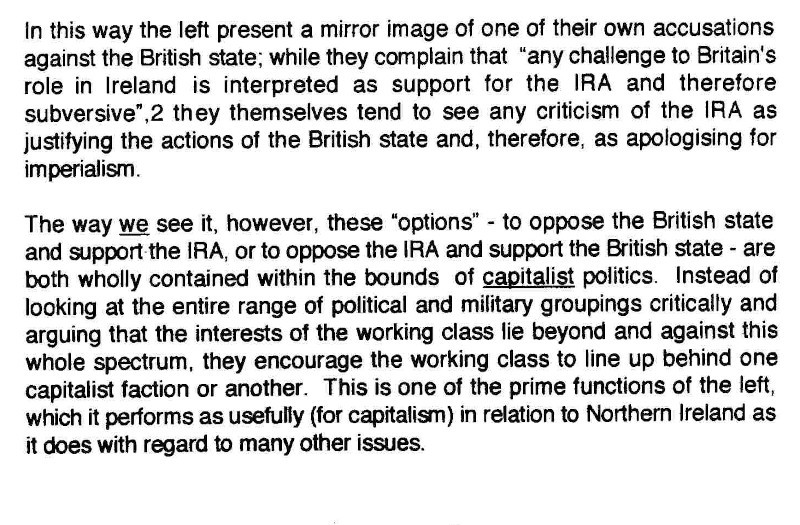
Red Action, which split from the SWP in 1981, was supportive of Republicanism and the armed campaign. Issue 68 of their eponymous paper, under the headline “I Am A Volunteer in the Irish Republican Army”, prints the statement to court of former Red Action member Patrick Hayes after his conviction for his part in an IRA bombing campaign. (The same issue also includes an article from the Irish Red Action on the drug epidemic in Dublin).
Irish Support Groups
Finally, it is worth noting the Irish support groups that existed in Britain, based generally among Irish emigrants. Clann na hÉireann was established in 1964 and was linked to Sinn Féin, remaining with the Official movement after the 1969 split. It published Rosc Catha from 1972, of which the archive includes the first issue. The Connolly Association is a Republican organisation which has existed since the 1930s, and has had prominent members from across the Left (including C. Desmond Greaves - see the ‘Communist Party of Great Britain’ section above). On the North, Orangeism - Myth and Reality outlines the history of the Orange Order in a lecture by Peter Berresford Ellis from 1995.
-
A perspective from the League for a Workers’ Republic in Ireland on the SLL can be read in their document, The Socialist Labour League and Irish Marxism (1959 – 1973): A Disastrous Legacy. ↩
-
Note that Labour then formed the Labour Party Young Socialists in 1965, which came to be dominated by Militant (see the ‘Labour Party and related groups’ section of this article). ↩
-
Bob Purdie’s response to the inclusion of this document in the archive can be read on the document page under the commentary. ↩
Documents
- 1971 — Northern Ireland Labour Party Young Socialists
- 1972 — Who is the Principal Enemy? Independent Labour Party
- 1974 — Crisis in Ireland Fabian Society
- 1974 — Workers Unity – Only Way Forward! Labour Party Young Socialists
- 1976 — Northern Ireland: The Unsolved Problem Independent Labour Publications
- 1981 — Northern Ireland Labour Party [Britain]
- 1984 — Final Agenda For the Twenty Third National Conference of the Labour Party Young Socialists Labour Party Young Socialists
- 1985 c. — What Has Ireland Got to Do with British Trades Unionists? What is Britain Doing to Ireland? Labour Party [Britain]
- 1970 — The Young Socialists 1970: Programme and Perspectives Young Socialists [SLL]
- 1971 — Torture Casebook: The Ulster Dossier Socialist Labour League
- 1980 — James Connolly and the struggle for Marxism in Ireland Workers Revolutionary Party
- 1988 — Politics from the Prisons and other Articles about Ireland Workers Revolutionary Party (Workers' Press)
- 1972 — Militant – Special Irish Edition Militant
- 1972 — What Happened in Derry International Socialists [UK]
- 1972 — International Socialism, No. 51 International Socialists [UK]
- 1980 — Why We Say: Troops Out of Ireland! Socialist Workers' Party [UK]
- 1992 — Ireland: Why the Troops Must Get Out Socialist Workers' Party [UK]
- 1972 — Ireland Unfree International Marxist Group
- 1979 — British Labour and Ireland: 1969 − 1979 International Marxist Group
- 1980 — Ireland's Victory Means Britain's Defeat Revolutionary Communist Tendency
- 1981 — TUC Hands off Ireland! Revolutionary Communist Tendency
- 1987 — The Next Step, No. 18 Revolutionary Communist Party
- 1983 — An Anti-Imperialist's Guide to the Irish War Irish Freedom Movement
- 1983 — The British Left and the Irish War Workers Power [UK]
- 1989 — Ireland: The Socialist Answer Socialist Organiser Alliance
- 1966 — The Easter Rising As History Communist Party of Great Britain
- 1968 — International Affairs Bulletin, Vol. 3, No. 1 Communist Party of Great Britain
- 1968 — Marxism Today, Vol. 12, No. 4 Communist Party of Great Britain
- 1969 — Northern Ireland: Civil Rights and Political Wrongs Communist Party of Great Britain
- 1973 — Marxism Today: Special Irish Number Communist Party of Great Britain
- 1973 — Britain and the Irish Crisis Communist Party of Great Britain
- 1979 — Ireland: The Young Communist League Calls for: Political Solution Not Military Young Communist League
- 1983 — Ireland: A Question for us all Communist Party of Great Britain
- 1985 — The Leninist: Ireland: Thatcher's Vietnam (Supplement) Communist Party of Great Britain (Leninist grouping)
- 1986 — Resistance, No. 3 Communist Party of Great Britain
- 1979 — Hands Off Ireland!, No. 9 Revolutionary Communist Group
- 1987 — Britain Out of Ireland! New Communist Party
- 1971 — Irish Liberation Press, Vol. 2, No. 3 Irish National Liberation Solidarity Front
- 1973 — Marxist Leninist Quarterly, No. 4 Communist Federation of Britain (Marxist-Leninist)
- 1974 — Ireland One Nation Communist Party of Britain (Marxist-Leninist)
- 1976 — The Irish Question: A Socialist Analysis Socialist Party of Great Britain
- 1983 — Ireland — Past, Present and Future Socialist Party of Great Britain
- 1981 — Ireland: Rising in the North Big Flame
- 1988 — 4 Days in Belfast and Derry: Views of Life in the north of Ireland Brighton Women and Ireland Group
- 1992 — Ireland: Nationalism and Imperialism - The Myths exploded Subversion
- 1994 — Red Action, No. 68 Red Action [Britain]
- 1972 — Rosc Catha, Vol. 1, No. 1 Clann na hÉireann
- 1995 — Orangeism - Myth and Reality Connolly Association
Comments
No Comments yet.
Add a Comment
Comments can be formatted in Markdown format . Use the toolbar to apply the correct syntax to your comment. The basic formats are:
**Bold text**
Bold text
_Italic text_
Italic text
[A link](http://www.example.com)
A link